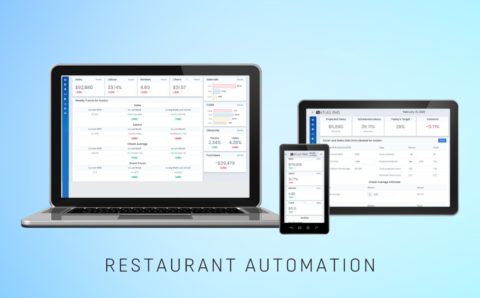
Python is a robust programming language that is widely used in the software development industry. In particular, Statista highlighted it to be among the top five most popular programming languages after conducting a survey among software engineers all over the world. Due to its versatility and adaptiveness, as well as the broad spectrum of frameworks and libraries, Python is able to fulfill a broad range of tech project requirements. It is used for different-scale applications, starting with web development and data analysis to scientific computing and artificial intelligence. Is Python good for software development, and what are its key benefits? What are the typical Python Use cases?
Table of Contents:
Desktop Graphical User Interface (GUI)
Python is an object-oriented language, which means it is designed to work with objects that represent data and functionality. Such a characteristic makes it great to create GUIs with reusable code and modular design. Besides, its dynamism and flexibility deliver the opportunity to achieve concise and expressive code at the same time. This results in faster development times with less code required, lower implementation costs, as well as easier maintenance of the codebase. Python is also compatible with other languages, like C and C++, allowing developers to integrate existing libraries and modules into their GUI applications.
Web Apps
Talking about Python in software development has a lot to offer for the web sector. Tech experts are able to benefit from the huge number of web development frameworks, such as Django, FastAPI, Flask, Pyramid, CherryPy, and more. They ensure an all-around set of tools and libraries that are useful for the most varied requirements of different projects. A long list of external libraries as well as modules are often used to enrich and expand the functionality of web solutions. In addition, this programming language is highly scalable, which is a vital peculiarity that determines the performance and the ability to handle high workloads for your web application.
Data Visualization
Data visualization has become much easier with Python as this programming language puts in the hands of developers a variety of libraries specifically created for this goal. The best libraries to visualize your data are Matplotlib, Seaborn, Plotly, and Bokeh. They allow comprehending complex data details by compiling them into charts, graphs, or other illustrative forms. Procuring a solid level of interactivity, the product can present the data in real time, with an opportunity to manage, manipulate, and research it. Thus, the usage of Python is a reasonable path to design custom visualizations addressing the specific data analysis requirements.
Data Science
Speaking about why you should use Python for software development within data science, it’s important to emphasize the availability of libraries for this technology. With Pandas, NumPy, SciPy, Scikit-learn, and TensorFlow, developers get a range of functions and algorithms to execute tasks like data manipulation, exploration, already mentioned visualization and machine learning integration. Aside from that, Python can scale with large datasets, which is a pretty wise option in case your project comprises big data. There are great tools for data cleaning, data transformation, and integration like Pandas, NumPy, scikit-learn, and more. In case the solution requires machine learning adoption, Scikit-learn, TensorFlow, and PyTorch libraries will help you build and train this technology’s models and algorithms.
Concerned about Software Development Costs?
Discover practical strategies to optimize your software development budget and maximize your return on investment.
Machine Learning
Machine learning is a complex technology that can be smoothly integrated with Python. This programming language ensures rapid prototyping and experimentation, which is particularly useful for quickly trying out diverse models and approaches. It is also excellent for a range of machine learning tasks, such as data preprocessing, model building, training, and evaluation. There are also machine learning libraries and frameworks, such as TensorFlow, PyTorch, and Scikit-learn that help train and deploy machine learning models efficiently. In case software engineers need to modify and extend existing models or build entirely new ones from scratch, these instruments are a must.
Web Scraping
Python has also become valuable for this task, as it easily completes web scraping tasks like data extraction, parsing, crawling, etc. Web scraping using Python allows developers to extract data from websites and web applications, which can be useful for data analysis and research purposes. This programming language also has many built-in data management and analysis tools, such as NumPy, Pandas, and Matplotlib, which streamline the operations and manipulations of the data scraped from websites. If your project requires a full-featured web scraping framework with advanced tools for handling complex web structures, managing request/response flow, and processing data pipelines, Scrapy is an appropriate option. And when the case has simpler scraping needs, such as parsing HTML or XML documents, extracting specific data, or modifying the document structure, BeautifulSoup offers a more lightweight and straightforward solution. Besides, both libraries have their strengths and can be used together if necessary. And another vital advantage – Python experts can automate regular or repetitive tasks associated with web scraping, which can save a lot of time and effort.
Benefits of Python for software development
Python has consistently ranked among the most popular programming languages in various industry surveys. In particular, Statista ranks it fourth within the list of most used programming languages, with 48.07% of developers using it. It has witnessed remarkable growth and adoption, becoming a go-to language for many developers and organizations worldwide because of its numerous benefits for software development.
Frameworks and Libraries
Python has an extended ecosystem of frameworks and libraries fitting into the specific project requirements. Using them, software engineers can build software solutions quickly and efficiently. These incorporate web frameworks like Django and Flask, as well as a broad choice of libraries for other diverse tasks, like data analysis, machine learning, and more.
Scalability
Python software development services are pretty demanded due to the opportunity to ensure robust performance within the digital product. It is solidly scalable and can become a wise choice for building applications of any size. Using Python for software development, you will achieve a solution that can seamlessly address and operate increasing workload, as well as amounts of data and traffic. This fact has made Python a popular choice for high-traffic websites and applications, such as social media, streaming services, gaming platforms, e-commerce solutions, and more.
Reliability
Reliability and stability are other valuable features that motivate software engineers to use Python for software development. It has a robust error-handling mechanism and offers many testing frameworks to ensure the quality of the code, as well as catch and handle errors effectively. This ensures that the code runs smoothly and prevents unexpected crashes. Reliable, qualitative, clean, and error-free code is obtained with testing frameworks, which enable it to conduct unit-test, pytest, and nose.
Security
You can benefit from numerous security features, such as cryptography libraries, secure sockets layer (SSL) support, and web application firewalls that guarantee safety and security for building web applications. Popular frameworks like Flask and Django offer secure features such as secure user authentication, cross-site scripting (XSS) prevention, and request forgery protection.
Extensive support
There is an expansive and enthusiastic community of Python software engineers who provide huge contributions to the programming language’s elaboration as well as support via online forums, mailing lists, and social media. These enthusiasts keep increasing the number of useful Python-based tools helping to address diverse challenges within software development. Having such an immense amount of support and effort, Python specialists can easily get help and find resources for troubleshooting, debugging, or optimizing code.
Need a Python Solution?
We build custom, scalable, and secure software using Python. Contact us to discuss your project requirements.
Which software shouldn’t be developed with Python?
While Python is a versatile language that can be used for a wide range of applications, there are some software types that may not fit Python best due to its operational limitation in certain areas.
Operating systems
Python is not considered to be the ideal option for developing operating systems due to its interpreted nature and lack of low-level programming support. For example, comparing Java vs. Python for software development within operating systems, the first option provides direct access to hardware and can work with low-level system resources.
Client-side mobile apps
While Python can be used for mobile app development, it may not be the best choice for client-side mobile app development. This is because the key client-side mobile apps require acceptable speed to deliver a quality experience, which is not the strength of Python. Moreover, Python lacks native UI components and may require the involvement of external libraries and frameworks for building user interfaces.
Video games
Developing high-performance and graphics-intensive games with Python is not a reasonable option. The use of this programming language will result in decreased performance compared to compiled languages, and it may not ensure direct access to hardware resources we’ve already discussed, which are essential for building high-capacity games.
Embedded systems
Python has a relatively high memory footprint and a lack of direct hardware access. While for this case, you may need programming languages that can work with low-level hardware and have minimal memory requirements, which are not the primary strengths of Python.

Elaborate
We helped Elaborate develop a system that simplifies lab results, featuring auto alerts, summaries, and guidance for next steps & doctor visits.

Robot Factory
Robot Factory provides insurance brokers with a streamlined platform to automate tasks, manage documents, and enhance productivity significantly.

Restaurant Management
Designed management software that centralizes POS and inventory data, enhancing efficiency, profitability with automation & analytics.
FAQ
Is Python used for software development?
Python is among the top 5 popular languages for software development, according to Statista. In the tech industry, it has found its use for a range of purposes, such as web development, desktop applications, scientific computing, data analysis, machine learning, and others.
Why do software companies use Python?
- Increased efficiency due to the faster development times
- A huge variety of powerful libraries and frameworks that can be useful for various tech tasks within a project
- Versatility, which makes it excellent for web development, desktop applications, scientific computing, data analysis, machine learning, and more
- The ability to scale up for large software development projects while being a great option for the smaller ones as well
- Free-of-charge usage, which helps reduce the cost of software development
When is Python not a good choice for software development?
- Operating systems. Python may not be the most relevant choice for developing operating systems or low-level system components due to its interpreted nature and the lack of support for low-level programming
- Client-side of mobile apps. Python is often an integral tool for mobile app projects. Nonetheless, when it comes to the client side of mobile solutions, there are better options for this goal. The reason for that is that it is not natively supported on all mobile platforms, and performance may be an issue.
- Video games. Especially when it comes to the graphics-intensive ones, as Python code is executed line-by-line rather than being compiled into machine code before execution. This can result in slower performance compared to languages that are compiled before execution, such as C or C++.
- Embedded systems. While Python is a powerful tool, it may not be well-suited to tasks that require direct control over hardware or low-level memory management and its potential for higher memory usage. Yet, it can be used in conjunction with other languages to overcome some of these limitations.

